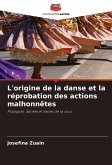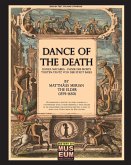This paper analyzes how Discursos sobre el arte del dançado, written and signed by Juan de Equivel Navarro, published in Seville in 1642, functions at the same time as a device of legitimization of certain dance practices, an element of validation of the circuits of power, a pedagogical instrument and a moral dissertation of the body. We will analyze how the book is presented as a result of the writing of relations between the development of the printing press, the persistence of a thought linked to medieval traditions and the fashions of the Spanish court of the seventeenth century in synergy with the courts of France and Italy. We will focus on the critical analysis of the modes of argumentation of the first chapter of Esquivel's treatise, in order to observe how the reason of names operates in the regulation of dances in a process that codifies gestures and designs spaces, bringing dancing closer to the logic of language because it aims to provide a reasonable character to theso-called honest actions, that is, an intelligible character: without misunderstandings.
Bitte wählen Sie Ihr Anliegen aus.
Rechnungen
Retourenschein anfordern
Bestellstatus
Storno








